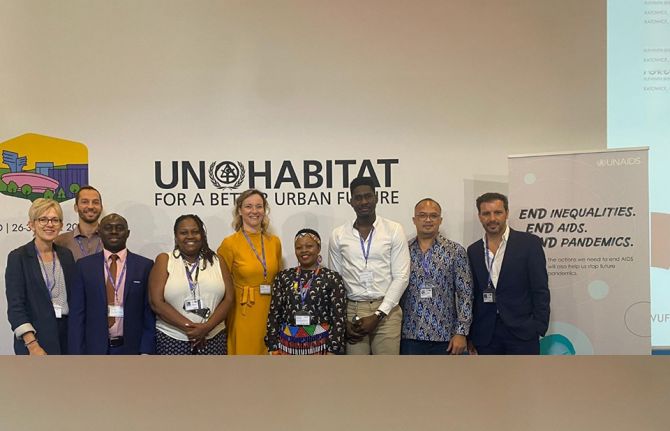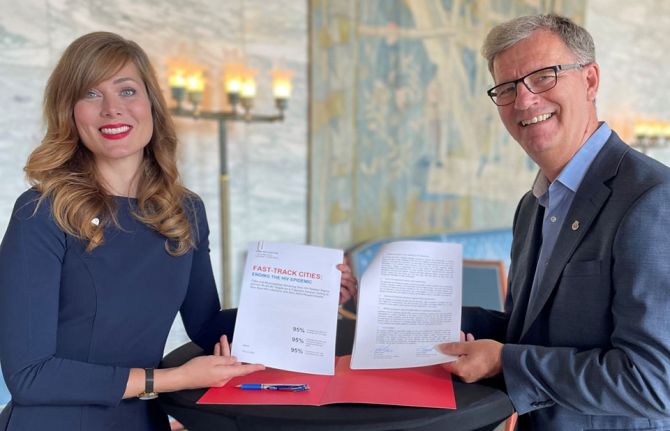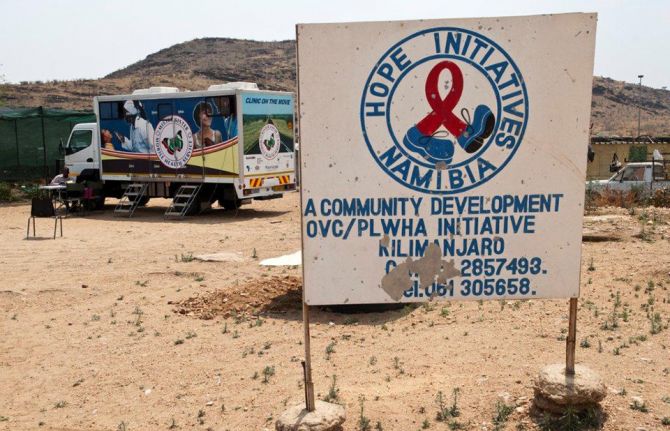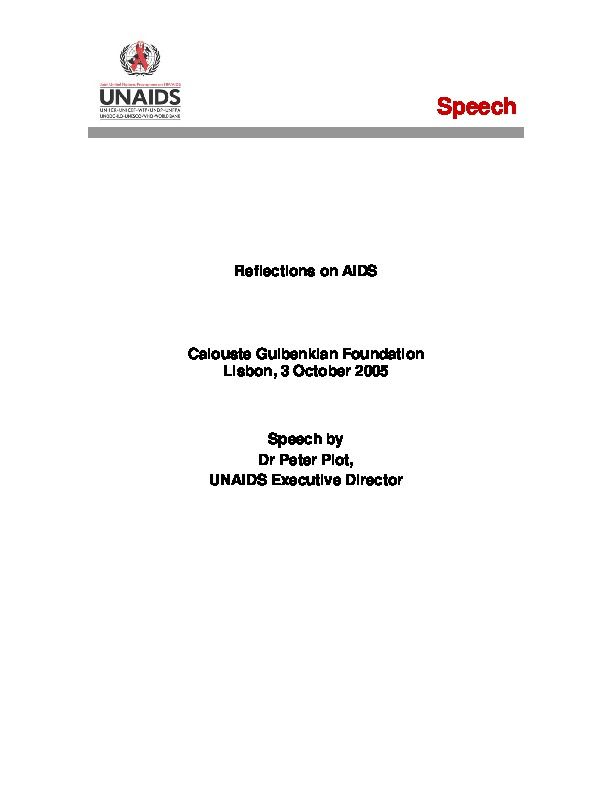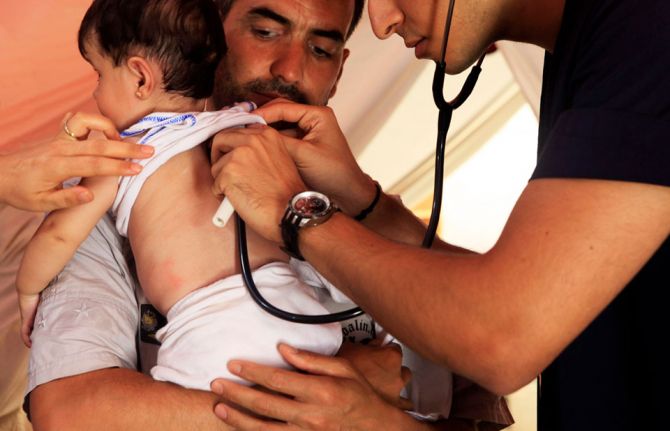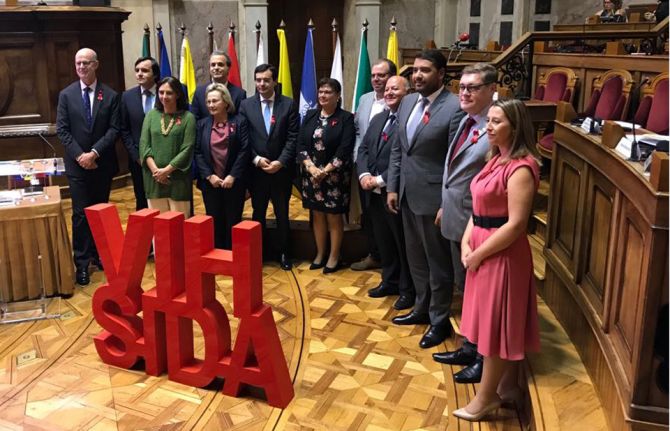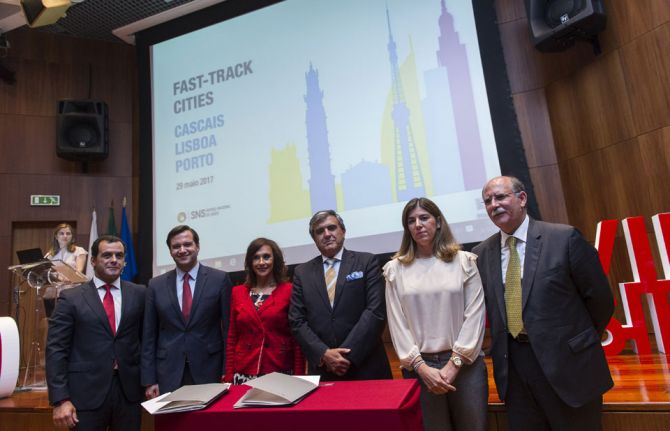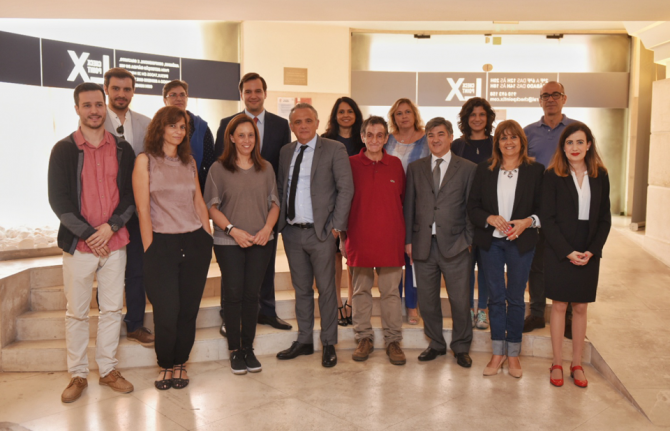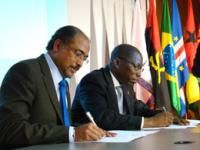PRT

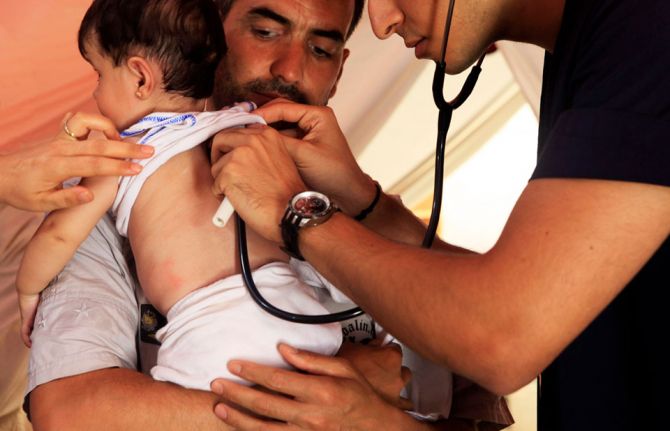
Press Statement
UNAIDS commends Portugal’s decision to grant temporary residency rights for immigrants and asylum seekers
02 April 2020 02 April 2020GENEVA, 2 April 2020—UNAIDS warmly welcomes the decision made by the Portuguese Government to grant temporary residency rights to all immigrants and asylum seekers who applied for residency in the country before 18 March 2020, when the state of emergency for COVID-19 was announced. These rights will give immigrants and asylum seekers access to social and health benefits, including access to the national health service, bank accounts and work and rental contracts, until at least 1 July 2020.
“UNAIDS is urging all countries to adopt a human rights-based approach in responding to COVID-19 that puts people at the centre and respects the rights and dignity of all,” said Winnie Byanyima, Executive Director of UNAIDS. “Portugal has demonstrated leadership and compassion by prioritizing these measures to protect the most vulnerable when responding to COVID-19.”
Migrants face the same health threats to COVID-19 as host populations and must be included to ensure an effective response that addresses both the health and socioeconomic impacts of the pandemic. Migrants and other key and vulnerable populations are often unable to access health and social services owing to fear of deportation, financial costs, legal constraints, language barriers, exclusion and fear of stigma and discrimination. Removing the barriers that prevent people from seeking medical and social care will improve broader public health outcomes, uphold the human rights of the most vulnerable and create a stronger, more effective and more equitable response to COVID-19.
Portugal has pioneered a human rights-based response to HIV since the outset of the epidemic, creating enabling legal environments, enacting progressive drug policies and making HIV treatment free for all, regardless of a person’s migration status. Portugal continues to lead today, driving community-based care models and promoting better integration of health-care services.
To help guide governments, communities and other stakeholders in planning and implementing measures to contain COVID-19, UNAIDS has produced a new guidance document that draws on key lessons from the response to the HIV epidemic, Rights in the time of COVID-19: lessons from HIV for an effective, community-led response.
UNAIDS
The Joint United Nations Programme on HIV/AIDS (UNAIDS) leads and inspires the world to achieve its shared vision of zero new HIV infections, zero discrimination and zero AIDS-related deaths. UNAIDS unites the efforts of 11 UN organizations—UNHCR, UNICEF, WFP, UNDP, UNFPA, UNODC, UN Women, ILO, UNESCO, WHO and the World Bank—and works closely with global and national partners towards ending the AIDS epidemic by 2030 as part of the Sustainable Development Goals. Learn more at unaids.org and connect with us on Facebook, Twitter, Instagram and YouTube.
Contact
UNAIDS GenevaSophie Barton-Knott
tel. +41 22 791 1697
bartonknotts@unaids.org
UNAIDS Media
tel. +41 22 791 4237
communications@unaids.org
Our work
Press centre
Download the printable version (PDF)
Region/country

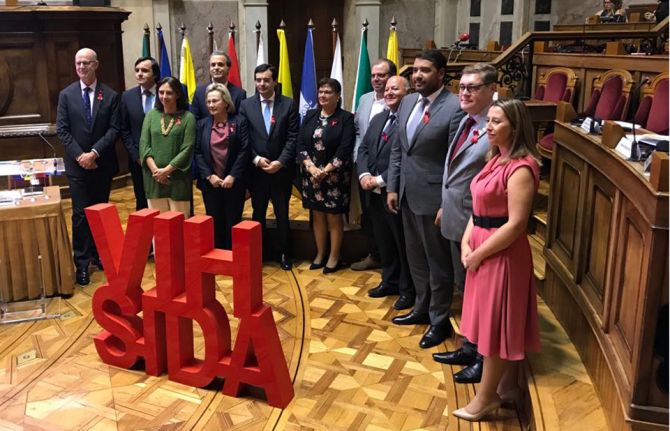
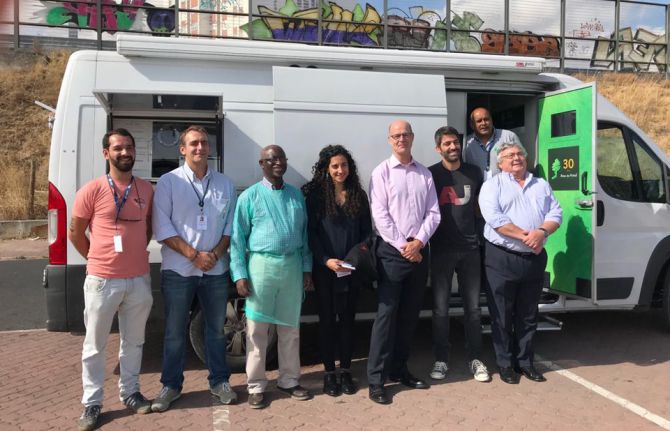
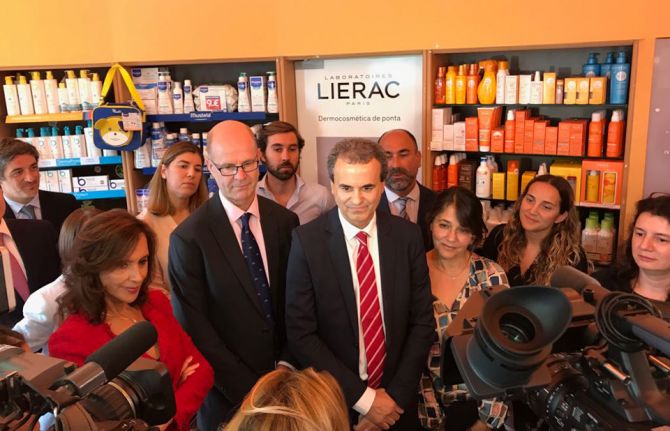
Update
More Portuguese cities commit to the Fast-Track
12 October 2018
12 October 2018 12 October 2018On 10 October, the mayors of the Portuguese cities of Almada, Amadora, Loures, Odivelas, Oeiras, Portimão and Sintra signed the Paris Declaration to end the AIDS epidemic in cities. Joining Cascais, Lisbon and Oporto, 10 Portuguese cities have now signed the declaration. In signing the Paris Declaration, mayors commit to putting their cities on the Fast-Track to ending the AIDS epidemic.
Portugal has been a pioneer in the AIDS response since the outset of the epidemic, creating enabling legal environments, enacting progressive drug policies and making HIV treatment free for all, regardless of their migration status. Portugal continues to lead today, driving community-based care models and promoting better integration of health-care services.
During a site visit in Cascais, Portugal, Tim Martineau, UNAIDS Deputy Executive Director, a.i., saw the nationwide launch of an initiative that aims to bring HIV services closer to the people who need them: HIV testing in community pharmacies. This initiative was integrated into the Cascais Fast-Track City Strategy. Self-testing is set to become available later this year, since the necessary legislation was just approved by the Portuguese Government
During his trip to Portugal, Mr Martineau also visited the Mobile Outreach Program of Aires do Pinhal – Association for Social Inclusion. With the support of the Ministry of Health, since 1986 the programme has provided harm reduction and social support services to people who inject drugs, giving access to services to about 1200 people daily. Services—including screening and treatment for HIV, hepatitis C, tuberculosis and syphilis, as well as methadone delivery, syringe exchange and distribution of condoms—are provided free from discrimination to people regardless of their nationality, including undocumented migrants.
The signing ceremony for the Paris Declaration was held at the Pálacio de São Bento in Lisbon, Portugal, and was attended by the Director-General of Health, Graça Freitas, Mr Martineau and representatives of civil society. In his closing speech, the Secretary of State, Fernando Araújo, expressed his hope that Portugal would continue to show leadership in the Fast-Track response to HIV.
Region/country
Related
 Government ensures continuity of treatment in Malawi
Government ensures continuity of treatment in Malawi

10 February 2025

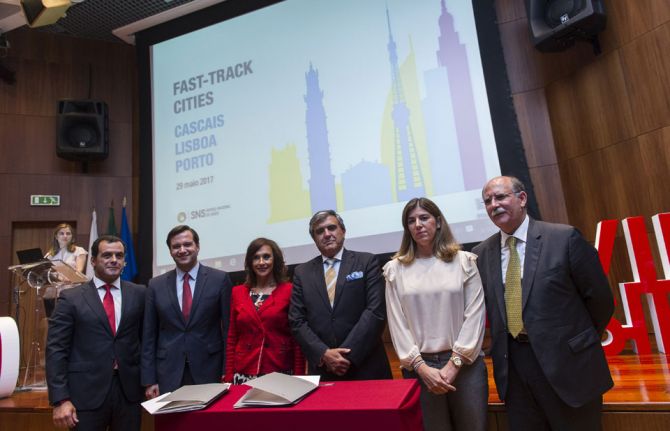
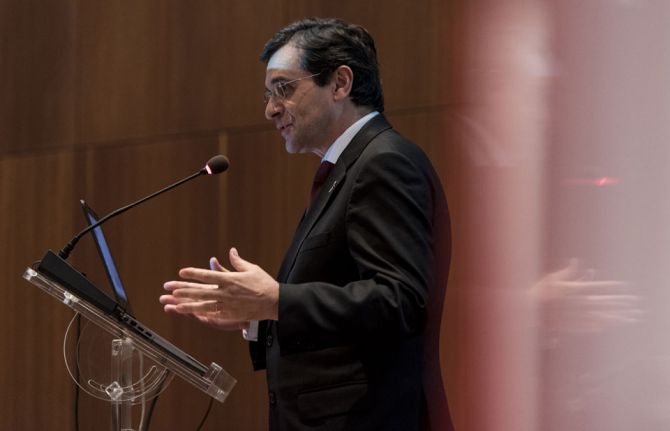

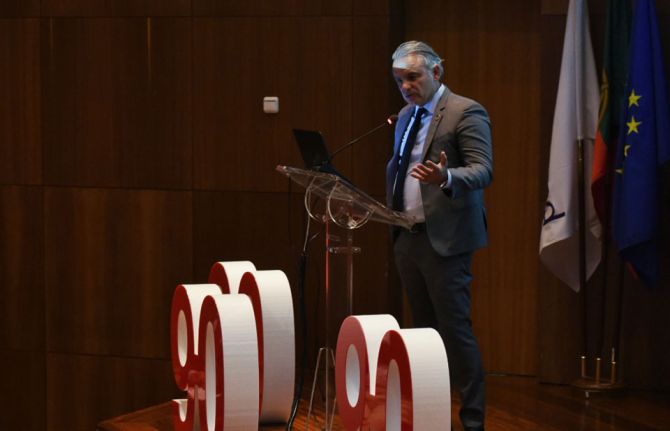
Update
Cascais, Lisbon and Porto sign the Paris Declaration on ending the AIDS epidemic in cities
31 May 2017
31 May 2017 31 May 2017The mayors of the Portuguese cities of Cascais, Lisbon and Porto have signed the Paris Declaration on ending the AIDS epidemic in cities—the first time that three cities in the same country have signed the declaration together.
In signing the Paris Declaration, mayors commit to putting their cities on the Fast-Track to ending the AIDS epidemic. The three mayors committed to achieving the 90–90–90 targets by 2020, whereby 90% of people living with HIV know their HIV status, 90% of people who know their HIV-positive status are accessing treatment and 90% of people on treatment have suppressed viral loads. They also committed to eliminating all forms of discrimination and developing a people-centred approach to the AIDS response, leaving no one behind.
During the signing ceremony, which took place on 29 May in Lisbon, Portugal, the Minister of Health of Portugal, Adalberto Campos Fernandes, reaffirmed the political commitment at the highest level to the response to HIV and highlighted that the 90–90–90 targets have a new impetus in the country.
The three cities will establish local strategies to remove barriers to accessing HIV services, eliminate discrimination and close the gaps to reaching the targets in the Paris Declaration. To that end, the Government of Portugal has put together a group of experts from government bodies, civil society and academia, who will identify and recommend concrete actions in the next 90 to 120 days.
During the event, the Director of the national AIDS programme, Isabel Aldir, presented the results of the national programme for HIV and tuberculosis for 2017. Ms Aldir said that in 2016, there were 841 new HIV infections in the country, the lowest for 15 years. Nonetheless, the plan for 2017 will focus on increasing the number of rapid tests by 15% and developing clinical guidance standards for the effective provision of pre- and post-exposure prophylaxis. The plan will also include preparing an evaluation report on a pilot project for dispensing HIV treatment in community pharmacies and promoting the implementation of the Fast-Track cities commitments.
Quotes
"Today is a historic day because, once again, Portugal proves that when we work together nothing is impossible. After winning the European Football Championship and the Eurovision Song Contest, it is now time to win the fight against AIDS. By working together, the government, city mayors, national health institutions, the social and private sector and civil society, we will build a better country, free of HIV and free of discrimination. Together we will always be stronger!"
"By joining the UNAIDS Fast-Track Cities global movement, Cascais has made a firm commitment to work towards the Sustainable Development Goals and to ending AIDS as a public health threat by 2030. The Cascais City Hall is proud to be working with SER+ Patient Association and other local and national partners in this project, promoting better health and more social justice for all our citizens."
“Portugal is an example of a successful response to AIDS that has put people’s needs first. Its success is based on a strong political leadership as demonstrated again here today, an inclusive legislation that protects people from discrimination and a very active civil society.”
“Political leadership is needed to facilitate access to health services, including for HIV, to migrant populations, whose HIV prevalence is increasing, especially in big cities. Portugal has become again a leading example on public health and human rights-based policies by removing all barriers on access to prevention, diagnosis and treatment of HIV, tuberculosis, viral hepatitis and sexually transmitted infections for undocumented migrants in 2017.”
“The International Association of Providers of AIDS Care welcomes the cities of Cascais, Lisbon and Porto as the most recent European cities to join the Fast-Track cities network. Working in collaboration with local stakeholders, including government officials, community representatives and clinical and service providers, we are convinced that these three cities can attain the 90–90–90 targets by 2020, thus assisting the country of Portugal to do so as well.”
Region/country
Related
 Government ensures continuity of treatment in Malawi
Government ensures continuity of treatment in Malawi

10 February 2025


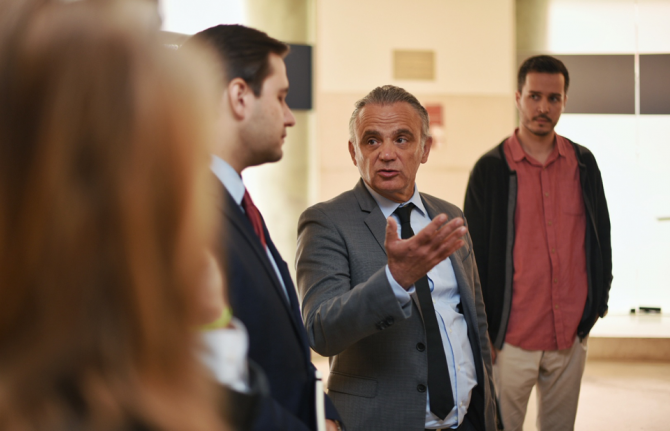


Update
Portugal: putting people at the centre of the AIDS response
30 May 2017
30 May 2017 30 May 2017Increased access to pre-exposure prophylaxis (PrEP) and HIV testing, together with the elimination of discrimination, are key to reducing new HIV infections in Portugal, representatives of civil society told UNAIDS Deputy Executive Director Luiz Loures in Lisbon, Portugal.
On 29 May, Mr Loures visited CheckpointLX, a community-based centre in Lisbon for men who have sex with men that offers rapid, confidential and free screening for HIV and other sexually transmitted infections, as well as counselling and referral to health care. During the visit, he discussed the challenges faced by civil society organizations in the response to HIV in the country.
The civil society representatives noted the progressive health policies that Portugal has regarding drug use, which are regarded as best practices in reducing new HIV infections among injecting drug users around the world. They also highlighted the importance of the current enabling legislation that is, for example, providing access to health services, including for HIV, to migrant populations regardless of their legal status, which puts Portugal at the forefront of the AIDS response in Europe.
The government’s political commitment to end AIDS by putting people at the centre of the response was further embodied by the Ministry of Health’s announcement on 29 May of the provision through the national health system of PrEP for key populations at higher risk of HIV infection, including gay men and other men who have sex with men and people who inject drugs, and for serodiscordant couples.
Nonetheless, challenges remain. Despite Portugal’s enabling legislation, the civil society representatives stressed the need to ease access to HIV prevention, diagnosis and treatment for migrant populations, given the raising HIV prevalence among migrants. The need to take a holistic approach in the provision of services, including screening for hepatitis, tuberculosis and sexually transmitted infections, was stressed. The representatives also noted that eliminating all forms of discrimination will be paramount to increasing access to services and to ending the AIDS epidemic as a public health threat by 2030.
UNAIDS is working with countries to achieve the commitment in the 2016 United Nations Political Declaration on Ending AIDS of ensuring access to combination prevention options, including pre-exposure prophylaxis, voluntary medical male circumcision, harm reduction and condoms, to at least 90% of people by 2020.
Quotes
“The HIV legislation in Portugal is a pathfinder for a broader protection of human rights. The provision of HIV services to migrants in the country is contributing to a more inclusive and safer society.”
“As a person living with HIV for the past 22 years, I strongly believe that we have all the elements needed to end AIDS in Portugal by 2030, and to achieve impressive results already by 2020.”
Region/country

Feature Story
CPLP and UNAIDS sign cooperation agreement in response to the AIDS epidemic
17 March 2010
17 March 2010 17 March 2010
UNAIDS Executive Director, Mr Michel Sidibé and CPLP Executive Secretary, Mr Domingos Simões Pereira signing the cooperation agreement. 17 March 2010, Lisbon, Portugal.
The Community of Portuguese-Speaking Counties (CPLP) and the Joint United Nations Programme on HIV/AIDS (UNAIDS) formalized their cooperation in response to AIDS in CPLP countries with a Memorandum of Understanding. The cooperation agreement was signed today by CPLP Executive Secretary, Mr Domingos Simões Pereira and by UNAIDS Executive Director, Mr Michel Sidibé.
“This agreement strengthens the cooperation that has existed for several years between CPLP and UNAIDS. We are particularly committed to promoting the human rights of people living with HIV and to preventing infection in those countries where Portuguese is the official language,” stated CPLP Executive Secretary, Domingos Simões Pereira.
The Memorandum of Understanding seeks to mobilize technical, political and financial support for civil society networks and organizations, including people living with HIV in the Portuguese-speaking countries. It aims to develop channels for sharing experiences between these countries, by means of horizontal South-South technical cooperation.
“South-South cooperation among Portuguese-speaking nations can help achieve universal access to HIV prevention treatment, care and support and eliminate mother to child transmission of HIV,” said Mr Sidibé. “We can learn from each other, especially when we share a common vision in changing the course of the AIDS epidemic.”
The cooperation agreement forms part of the activities of the III CPLP Congress on HIV/AIDS and Sexually Transmitted Diseases, which is being held in Lisbon, Portugal from March 17-19.
CPLP and UNAIDS sign cooperation agreement in res
Press centre:
Download the printable version (pdf, 44 Kb)
Multimedia:
Contact:
António Ilharco CPLP Portugal tel. +351 21 392 85 60 imprensa@cplp.org
Saya Oka UNAIDS Geneva tel. +41 22 791 1697 okas@unaids.org
Pedro Chequer UNAIDS Brazil tel. +55 61 3038 9220 chequerp@unaids.org
External links:
Community of Portuguese-Speaking Counties (CPLP)
III CPLP Congress on HIV/AIDS and Sexually Transmitted Diseases (CPLP)

Feature Story
Strengthening the AIDS response in Portuguese speaking countries
28 July 2008
28 July 2008 28 July 2008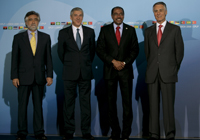
(L to R): Luís Amado, Minister of Foreign
Affairs of Portugal; José Sócrates, Prime
Minister of Portugal; Michel Sidibè,
UNAIDS Deputy Executive Director;
Aníbal Cavaco Silva, President of the
Republic of Portugal- during the VII
CPLP’s Heads of State Summit.
Photo: Luis Filipe Catarino
The Community of Portuguese Speaking Countries (CPLP) Heads of State’s Summit took place on 24 and 25 July in Lisbon, Portugal. The summit, which happens every two years, is an opportunity to review progress made and to improve cooperation between CPLP Member States on political, economic, social and cultural issues. One of this year’s topics was dedicated to the improvement of cooperation in the AIDS response.
The summit brought together representatives of CPLP’s Member States (Angola, Brazil, Cap Vert, East Timor, Guinea Bissau, Mozambique, Portugal and Sao Tome e Prince), Observer States (Guinea Equatorial, Mauritius, Senegal) and representatives from international organizations (Africa Union, FAO, UNESCO, UNAIDS, CEDEAO, UNASUL).
UNAIDS Deputy Executive Director Michel Sidibe participated in the CPLP summit as a keynote speaker at the Civil Society Forum on Health Affairs. This side event was an initiative of Former President Sampaio, CPLP’s Goodwill Ambassador for Health Affairs and United Nations Special Envoy to Stop TB.
At the summit, UNAIDS and CPLP announced a new partnership as a result of the existing engagement and collaboration between CPLP’s countries and UNAIDS. This collaboration was reflected in the launch of a new report by CPLP highlighting progress made towards universal access to treatment, prevention and care in the CPLP’s countries. Furthermore, the Ministers of Foreign Affairs of the eight Member States also approved an AIDS declaration during the summit.
In order to further highlight the issue of HIV during the Summit and to foster a new generation of leaders committed to the AIDS response, UNAIDS in partnership with the CPLP and National Portuguese Television (RTP) held a televised town hall on AIDS.
“Alerta Sida”, “Aids Alert” was broadcasted on 23 July, the eve of the Summit, by RTP AFRICA and RTP International.

UNAIDS Deputy Executive Director Michel
Sidibè with Lula da Silva, President of
Brazil - during the 2008 Community of
Portuguese Speaking Countries (CPLP)
Heads of State’s Summit. 24 and 25 July
Lisbon, Portugal. Photo: UNAIDS
University students from different CPLP countries put a series of questions to a panel of experts representing the CPLP, technical programming and civil society.
The panel answering students’ questions were CPLP Executive Secretary Ambassador Luís Fonseca (Cape Vert); Portugal’s National AIDS Coordinator Professor Henrique de Barros; and General Coordinator of Abia (a Brazilian non-governmental organization) Dra. Cristina Pimenta.
Video messages from some CPLP Heads of State; UNAIDS’ Deputy Executive Director, Michel Sidibe and Former President Sampaiom, CPLP’s Ambassador for Health Issues were also broadcasted.
This initiative also had the support of Lusófona University.
The 80 minute programme included a short report about the AIDS epidemic in Mozambique, the Portuguese-speaking country with the highest numbers of people living with HIV.
Strengthening the AIDS response in Portuguese spe

Feature Story
European meeting discusses migration, TB and HIV
15 October 2007
15 October 2007 15 October 2007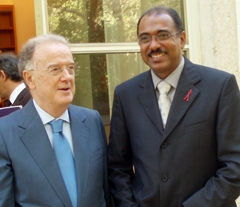
UNAIDS Deputy Director Michel Sidibe with former
President of Portugal and United Nations Special
Envoy to the Stop TB Programme, Jorge Sampaio.
Migration, mobile populations and tuberculosis were priority focus areas at the meeting of EU national AIDS Coordinators, organized by the Portuguese Presidency of the European Union. UNAIDS Deputy Director Michel Sidibe stressed that increased action in these areas is vital in the goal of universal access to HIV prevention, treatment, care and support.
“European governments have a big part to play in making universal access a reality,” said UNAIDS Deputy Director, Michel Sidibe. Underlining commitments on AIDS made by the EU member states, he urged governments to “provide leadership and funding at home and abroad [with] a special duty to support neighbours in Eastern Europe and North Africa.”
Held as part of the events organized during the Portuguese Presidency of the EU, participants included representatives from EU Member States and neighbouring countries.
With increased labour migration, or the movement of people across borders in the region, the issue of AIDS specific issues and responses concerning migrants and mobile populations in Europe was high on the meeting agenda.
Numerous factors related to migration, including socio-economic and cultural factors as well as government processes and the conditions in destination countries, impact on HIV risk and the rights of migrants living with HIV.
“AIDS spreads as economies boom - as people move from rural to urban areas, from country to country, in search of a better life,” said UNAIDS Deputy Executive Director Michel Sidibe, underlining that movement across borders introduces HIV risk as people spending long periods of time away from home are more likely to engage in casual sex, may be placed in situations which make them vulnerable to HIV and often find themselves living on the margins of society, where they cannot access the HIV prevention and treatment services they need.
“This is made worse when there is no consistency between States regarding access to HIV services. In some countries undocumented migrants can access services – provided they know where to go. In others they can’t. In some, they have to pay at point of service delivery; at others they don’t. This is not universal access!” Sidibe said, noting that UNAIDS, the International Labour Organization and the International Organization of Migration are currently drafting a policy on HIV and migration which is expected for release shortly.
Focus on migrant workers within the AIDS response is key, he underlined, “for humanitarian and human rights reasons. For public health reasons and for socio-economic reasons: if migrants are healthy, they can make an active contribution to economic growth.”
Sidibe noted Portugal’s response to the issue of HIV and migration as an example of best practice that should be built on across the EU. “Portugal has blazed a brave trail in two key areas - introducing harm reduction programmes for injecting drug users and providing HIV services to migrants – documented and undocumented,” he said.
Tuberculosis and the interaction between TB and HIV epidemics in the region was also a key focus area for the EU meeting. The development and spread of multi-drug resistant and extensively drug resistant tuberculosis, especially among people living with HIV, was underlined as a serious concern for Europe and Africa, and one that threatens the achievement of universal access and the millennium development goals.
Underlining the need for a joint response to TB and HIV in the region and worldwide, the UNAIDS Deputy Executive Director met with former Portuguese President and UN Special Envoy to the Stop TB Partnership, Jorge Sampaio. At the meeting, Sidibe stressed UNAIDS commitment to advocating for a joint response on TB and HIV and encouraged Special Envoy Sampaio to continue his important work on these key health issues.
During his intervention in Lisbon, the UNAIDS Deputy Executive Director also met with the Portuguese Minister of Health, Mr Correia de Campos, Secretary of State for European Affairs, Mr Manuel Lobo Antunes and with the Executive Secretary of the Community of Portuguese-speaking Countries, Ambassador Luís de Matos Monteiro da Fonseca. In all meetings, Sidibe underlined the importance of the next European Union - Africa Summit and that it will be crucial to have AIDS on the agenda.
“We must lead by example and assure universal access to HIV prevention, treatment, care and support within this region by 2010,” said Sidibe.
Links:
Read more on migration
Related
29th Ordinary General Assembly of the Organization of African First Ladies for Development
16 February 2025
55th meeting of the UNAIDS Programme Coordinating Board
10 December 2024
20th Indian Ocean Colloquium on HIV/AIDS
22 October 2024
University of Pompeu Fabra
17 October 2024
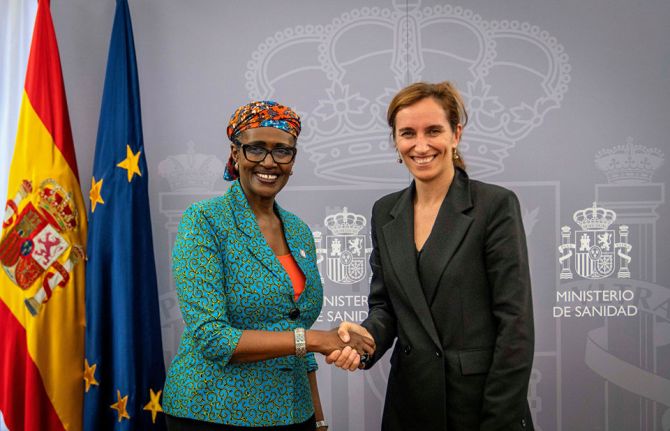 UNAIDS welcomes the Spanish government’s announcement of a new € 1 million contribution to overcome the global AIDS pandemic
UNAIDS welcomes the Spanish government’s announcement of a new € 1 million contribution to overcome the global AIDS pandemic

15 October 2024
Linking UN Summit of the Future with COP29
26 September 2024
Revitalized Multilateralism
24 September 2024
Plenary debate of the Summit of the Future
23 September 2024
African Union Year of Education
23 September 2024





